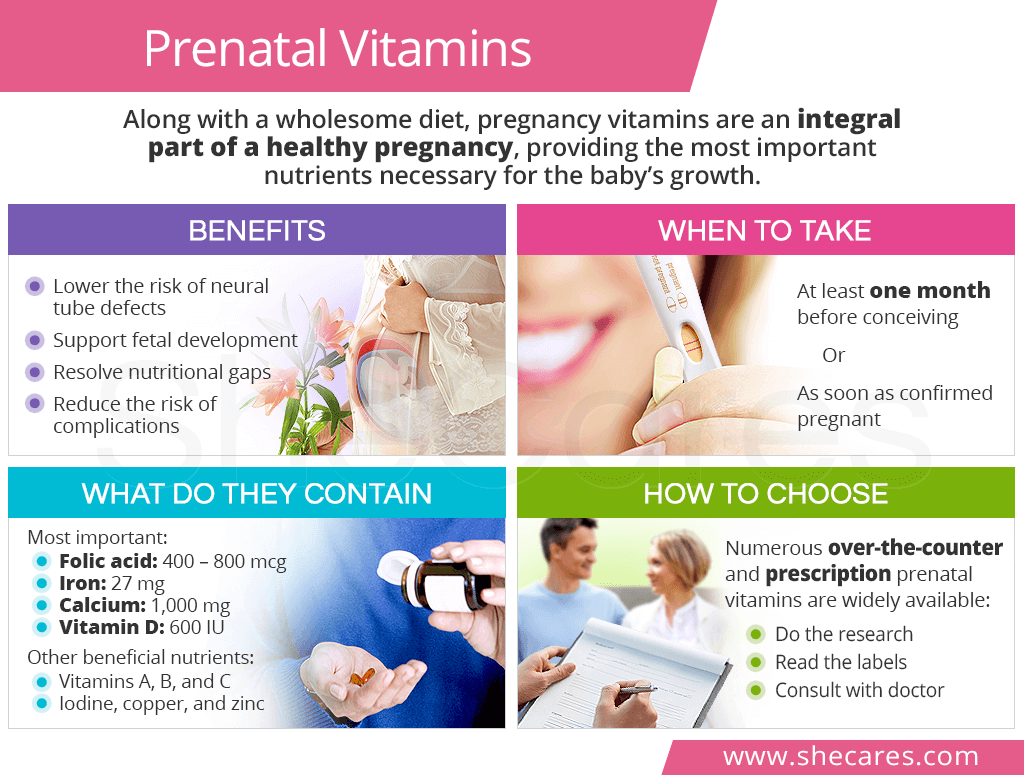What are Prenatal Vitamins?
Prenatal vitamins, or pregnancy vitamins, is the term for supplements containing a blend of vitamins and minerals that are necessary for fetal development and a healthy pregnancy.
Prenatal vitamins should complement, not replace, a balanced pregnancy diet.
Why are Prenatal Vitamins Important?
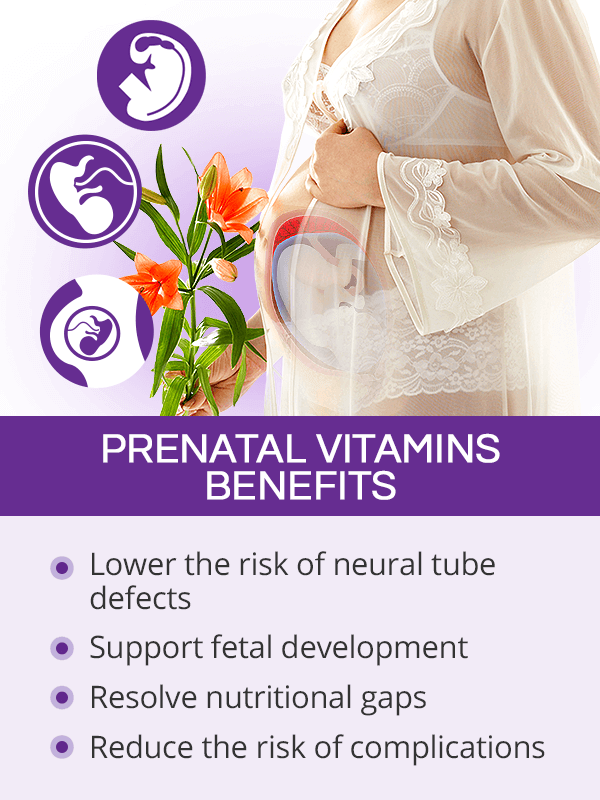
Pregnancy vitamins are a necessary part of adequate prenatal care, offering a variety of benefits.
Most importantly, supplementation with prenatal vitamins containing folic acid during pregnancy has been shown to greatly reduce the risk of neural tube defects. Folic acid, a form of vitamin B9, is crucial for the formation of the neural tube in the first month of pregnancy, which is a structure preceding the brain and spinal cord.
Also, because women's daily nutrient intake requirements increase during pregnancy, prenatal vitamins ensure that the baby gets all the nutrients he or she needs to grow and the mother to withstand pregnancy demands. They also help prevent deficiencies that could lead to pregnancy complications, like preterm birth, preeclampsia, or low birth weight.
When Should You Start Taking Prenatal Vitamins?
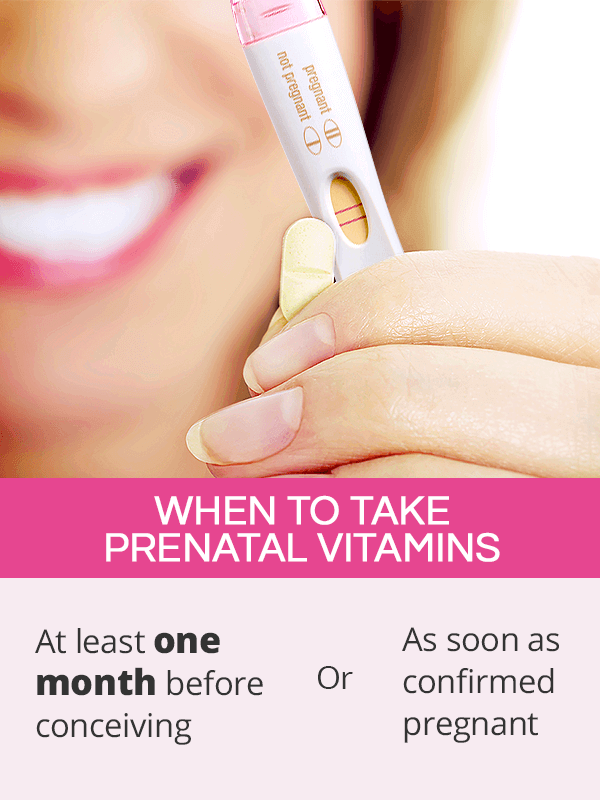
Generally, a woman should start taking prenatal vitamins as soon as she finds out she is pregnant and continue throughout all pregnancy stages, unless otherwise instructed by the doctor. Sometimes women might be advised to take the vitamins in postpartum, too.
However, for women who have been preparing to get pregnant and are actively trying to conceive, it is highly recommended to start prenatal vitamins at least one month before conceiving. This is due to the fact that neural tube defects take place in the first month of pregnancy when a woman might not yet know she is pregnant.
What do Prenatal Vitamins Contain?
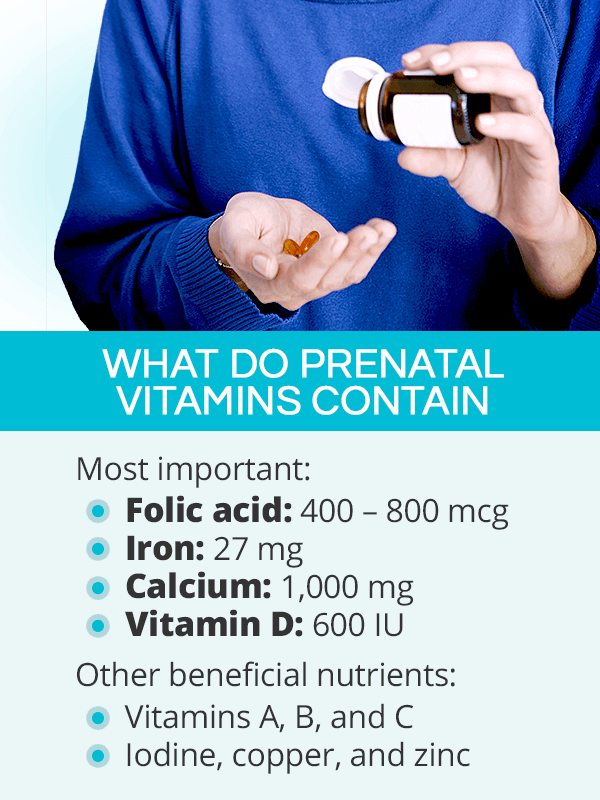
Generally, the ingredients in prenatal vitamins are similar to those of standard multivitamins with higher doses of folic acid and iron.
However, there are no official, scientifically-proven recommended dosages of vitamins and minerals that pregnancy supplements should contain. As such, different brands vary a great deal in terms of their content.
Nevertheless, the American College of Obstetricians and Gynecologists recommends that all pregnant women obtain the following nutrients collectively from diet and supplements:
- Folic acid: 400 - 800 mcg
- Iron: 27 mg
- Calcium: 1,000 mg
- Vitamin D: 600 IU
Women who have had a child affected by neural tube defects or are at an advanced age might be recommended higher doses of folic acid during pregnancy (4-5 mg daily).
Other nutrients beneficial for fetal development that are worth looking for in pregnancy supplements include vitamins A, B, and C as well as iodine, copper, zinc, and omega-3 fatty acids.
How to Choose a Prenatal Vitamin
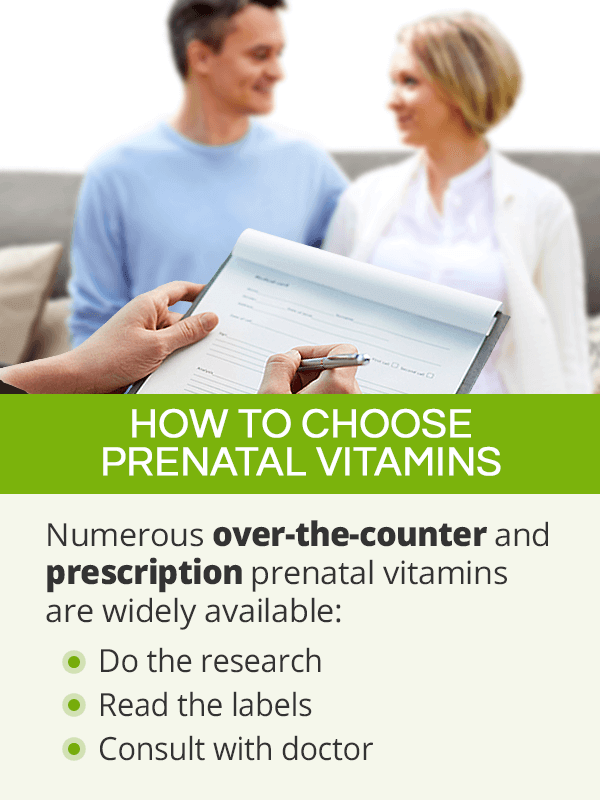
The best approach to choosing the best prenatal vitamins is to consult one's OBGYN during the preconception check-up or first prenatal visit. Reliable medical advice regarding pregnancy supplements can also help prevent accidental overdosing on certain vitamins or minerals, such as vitamin A, which can be harmful to the baby.
Over-the-Counter Prenatal Vitamins
When choosing from widely available, non-prescription prenatal vitamins, it is worth researching the brands and reading the labels to avoid synthetic vitamins, artificial fillers, added sugars, and other unnecessary additives. Numerous cost effective, over-the-counter multivitamins offer adequate blends of pregnancy vitamins and minerals, even if not labeled as such.
Prescription Prenatal Vitamins
Some women might be prescribed prenatal vitamins if they have certain nutritional deficiencies or pre-existing conditions, like iron-deficiency anemia, that necessitate a more customized vitamin blend. Because they are usually more expensive, the cost of prescription pregnancy vitamins might be partially or fully covered by some health insurance plans.
Key Takeaways
Prenatal vitamins are an integral part of a healthy pregnancy and should be started a month before conceiving or as soon as a woman is confirmed pregnant. Of the various nutrients that are found in pregnancy supplements, folic acid, iron, and calcium are the most widely studied. Supplementation with 400 mcg of folic acid during pregnancy has been found to greatly decrease the risk of neural tube defects, while other nutrients lower the risk of pregnancy complications and support fetal development. Because of their role in baby's growth, it is worth researching the available over-the-counter pregnancy supplements in order to find a well-balanced, quality brand. As always, it is best to consult with one's doctor for a personally tailored recommendation, especially if prescription prenatal vitamins are more appropriate for one's needs.
Sources
- American Pregnancy Association. (2018). Prenatal Vitamins. Retrieved July 1, 2019 from https://americanpregnancy.org/pregnancy-health/prenatal-vitamins/
- American Pregnancy Association. (2018). Prenatal Vitamin Ingredients. Retrieved July 1, 2019 from https://americanpregnancy.org/pregnancy-health/prenatal-vitamin-ingredients/
- American Pregnancy Association. (2018). Types of Prenatal Vitamins. Retrieved July 1, 2019 from https://americanpregnancy.org/pregnancy-health/types-prenatal-vitamins/
- Eunice Kennedy Shriver National Institute of Child Health and Human Development. (). What is prenatal care and why is it important? Retrieved July 1, 2019 from https://www.nichd.nih.gov/health/topics/pregnancy/conditioninfo/prenatal-care
- Mayo Clinic. (2018). Prenatal Vitamins: Why they matter, how to choose. Retrieved July 1, 2019 from https://americanpregnancy.org/pregnancy-health/prenatal-vitamins/
- National Health Service. (2017). Vitamins, supplements, and nutrition in pregnancy. Retrieved July 1, 2019 from https://www.nhs.uk/conditions/pregnancy-and-baby/vitamins-minerals-supplements-pregnant/
- Nutrition Reviews. (2016). Role of maternal vitamins in programming health and chronic disease. Retrieved July 1, 2019 from https://www.ncbi.nlm.nih.gov/pmc/articles/PMC4892288/
- Office on Women's Health. (2019). Prenatal care. Retrieved July 1, 2019 from https://www.womenshealth.gov/a-z-topics/prenatal-care
- Planned Parenthood. (n.d.). What Are Prenatal Vitamins? Retrieved July 1, 2019 from https://www.plannedparenthood.org/learn/pregnancy/pre-pregnancy-health/what-are-prenatal-vitamins
- United States Department of Agriculture. (2015). Why Take a Prenatal Supplement? Retrieved July 1, 2019 from https://www.choosemyplate.gov/moms-pregnancy-prenatal-supplements
